Posted by barb on Mar 11, 2008 in
Science Musings It’s coming!!!
On Friday, everyone can talk like a physicist. Not sure how to do that? Check out the FAQ on the Talk Like a Physicist blog. And for those of you physicists who do not think you talk like a physicist (like me), rest assured, you do.
Tags: science
Posted by barb on Dec 20, 2005 in
Science Musings Judge rules against “intelligent design”
Pharyngula has excerpts from the ruling, or the whole text can be found here (PDF file; I haven’t read the whole thing yet).
To be sure, Darwin’s theory of evolution is imperfect. However, the fact that a scientific theory cannot yet render an explanation on every point should not be used as a pretext to thrust an untestable alternative hypothesis grounded in religion into the science classroom or to misrepresent well-established scientific propositions.
A voice of reason!
Tags: science
Posted by barb on Sep 26, 2005 in
Pictures,
Science Musings 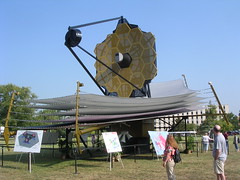
Last week, a full-scale model of the James Webb Space Telescope was installed outside one of the buildings at work. Yikes! It’s huge! Check out the picture for the scale. The mirror is 6.5 meters in diameter and the sun shield is the size of a tennis court, which might sound big, but I never really understood the scale until I walked around underneath it.
Tags: work
Posted by barb on Aug 12, 2005 in
Science Musings Last weekend I started researching the history of relativity — how was it recieved when it was first presented to the world? who were the dissenters? how was it presented to the general public? I can’t say much about the project that I’m working on (but, trust me, it’s really cool — afterall, I was working on a Saturday and I was excited about it).
I found a few fun things:
- When Einstein’s lectures and book were advertised in Japan, the title was translated to “The Relations of Man to Woman”. There were large crowds, especially women, at the first few lectures and hundreds of the books were sold. After a few days, the tour sponsors were inundated with requests for refunds. (From “Einstein’s Theory Not Exactly What Japanese Expected”, Washington Post, January 14, 1923, p 25.)
- A US Naval astronomer, Captain See, denounced Einstein and relativity after Lick Observatory published results on the bending of starlight which supported relativity.
“I value highly the work of the Lick Obseravatory,” said Captain See, “but I regret to see it issue statements to the press which lend support to the discredited doctrine of relativity than which a greater piece of humbuggery has not appeared in any age.”
(From “Astronomer Calls Einstein Plagiarist”, Christian Science Monitor, April 13, 1923, p 3.)
- In a gossip-like column, Einstein’s ability to figure change is questioned. He and his wife had boarded a street car, and he paid the conductor. The conductor returned his change while Einstein was talking with his wife. Einstein distractedly counted his change, and belived the conductor had given him the wrong change.
The [conductor] recounted the change deliberately, explaining the to professor that it was correct and then turned to the next passenger with a shrug of his shoulders and the remark, “His arithmetic is weak.”
(From “Relativity Author Weak at Figuring, Car Man Declares”, The Washington Post, July 13, 1924, p ES9)
Not related to relativity, but way too entertaining not to include here:
The women of the future may have longer beards than the beared women of the circus today, in the opinion of Dr. Adolph Heilbron, if they continue the invasion of man’s doman of activities.
“As woman exercises more and more the functions formerly belonging to men,” Heilbron writes in the Berlin Morgenpost, “she also begins to assume a masculine growth of hair.”
(Also from “Relativity Author Weak at Figuring, Car Man Declares”, The Washington Post, July 13, 1924, p ES9)
Tags: science
Posted by barb on Jul 20, 2005 in
Science Musings Be sure to check out Google today, and click on today’s logo. (Or, click here, if you’re here after July 20.)
[Thanks, JD, for pointing this out!]
Tags: science
Posted by barb on Jul 10, 2005 in
Science Musings Astro-E2 successfully launched last night! This is a Japanese X-ray astronomy satellite, and on-board is a NASA instrument, XRS. When I first came to Goddard 7 years ago, I was a grad student working with the original XRS team. When Astro-E failed to achieve orbit, Astro-E2 was born. The Japanese and instrument collaborators rallied for funding and support for a new satllite.
XRS is the first microcalorimeter X-ray spectrometer to be flown on a space mission, and represents a giant leap forward in spectral sensitivity. It will be exciting to see the results from XRS in the coming months and years.
Upon the success of launch, Astro-E2 has been renamed Suzaku. Suzaku represents the red sparrow, is the southern point of the compass, and is
symbolic of renewal. What a great name!
Tags: science
Posted by barb on Jul 4, 2005 in
Science Musings Science Magazine has published a list of the 125 Questions: What We Don’t Know. How cool is that?
One issue that I’ve been discussing with colleagues is the public’s lack of understanding of the process of science. In classrooms, science is taught as though we have all of the answers: gravity holds us to the Earth and sets the planets’ orbits around the Sun, the Earth’s surface is in constant motion as the techtonic plates move on top of the matle, the diversity of life that we see comes from processes of evolution, etc. And while these theories are well-supported, and accepted among all of the science community, by teaching students only the end-product of decades or centuries of debate, discussion and development, the process of science gets lost.
In the teacher focus group that I was involved with, we found that high school science teachers are hungry for cutting-edge science in their classrooms. Such science is not typically included in textbooks, because science doesn’t have all of the answers yet, so that textbook writers can’t summarize the results in a nice, neat package. Such cutting-edge science would require updates to the textbooks on timescales that most schools couldn’t afford, or supplements that schools are unwilling to pay for.
By not including this cutting-edge, not-neatly-packaged science in the high school classroom, students don’t get to see that science is very much alive. They don’t get to see what they might be able to contribute to science if they decided to pursue science. Most importantly, they don’t get to see science as a process.
One hundred years ago, the concept of “other galaxies” had not been considered, because astronomers did not have the techniques to measure distances to objects that far away. Eighty years ago it was thought that the Universe was static — not expanding, not contracting; then, Hubble showed that the Universe was expanding. Ten years ago, astronomers assumed that the expansion rate of the Universe was decelerating, but then astronomers made observations of very distant supernovae that indicated that the rate of expansion was accelerating. What will change in the next 10 years? This is Science Magazine’s #1 question.
I’m working with a group to develop a classroom activity that would use dark energy or gravitational waves to show their students the process of science — to help the students understand that science evolves as technology develops and as scientists wrap their minds around new concepts, and that healthy debate is a large part of the science process. Perhaps we aren’t going to change the world with our one small activity, but maybe other scientists and science educators will follow suit. It is imperative that we enlighten the public on the process of science. We aren’t just throwing around hunches that we hope fit the data — we are developing well-supported and well-debated theories to understand the world, and Universe, around us.
Tags: science
Posted by barb on Jul 3, 2005 in
Science Musings The Deep Imact probe will be impacting over night tonight. Imact is set to happen at 1:52 AM (Eastern Daylight Time, 12:52 AM Central Daylight Time). The impactor successfully separated last night (2:07 AM Eastern Daylight Time Sunday morning).
Here are some resources for “watching” the impact:
Tags: science
Posted by barb on May 31, 2005 in
Science Musings,
Travels Felicia presented her poster at the AAS meeting yesterday, so I took a few pictures for her to remember her trip.
Here she is asking a question about the Chandra X-ray Observatory.
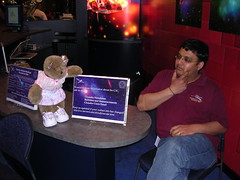
She also stopped at the American Astronomical Society booth to ask about membership.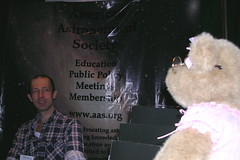
When Felicia passed by the Glast booth, she saw that JD was having some trouble with a Python script, so she stopped to help him out.
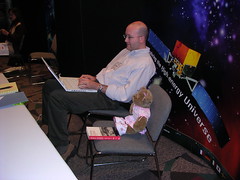
At the end of the day, she had picked up just about every give-away she could find in the Exhibit Hall – she could barely lug her bag back to the car.
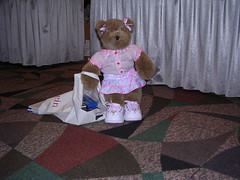
We’ll post all of her pictures from her big day after we return home next week.
Tags: build-a-bear, trip report




